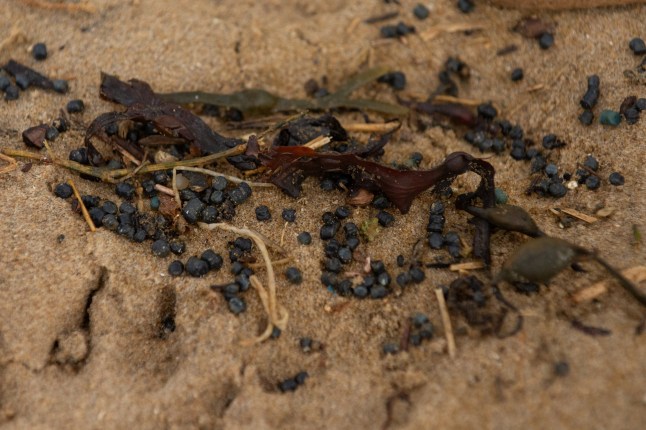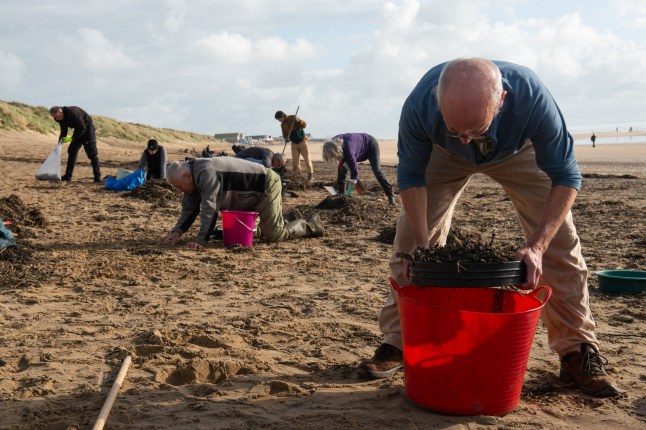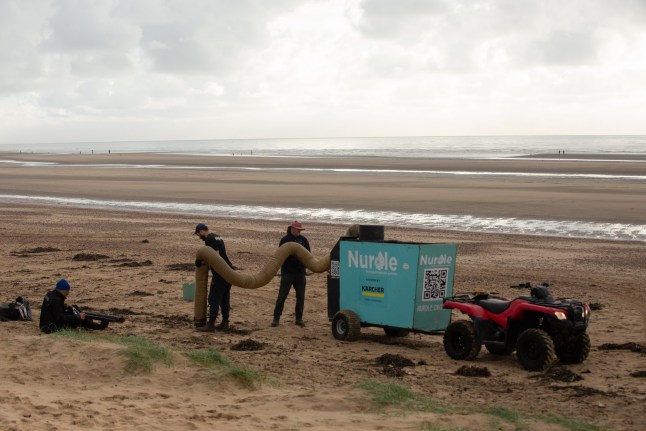
Camber Sands in East Sussex has been polluted by bio-beads (Picture: Sarah Tilotta/Getty Images)
Hundreds of thousands of plastic beads have washed up on Camber Sands in East Sussex,causing an ‘environmental catastrophe’ that could seriously harm dogs,an MP has warned.
Camber Sands has more than two miles of golden beach and is the home to the only sand dune system in East Sussex,making it a natural habitat to many animals and plants.
But now,these species,as well as any visiting dogs,may be at risk of choking or toxication from these washed-up pellets.
Helena Dollimore,MP for Hastings and Rye,has written to the head of Southern Water expressing her concerns about this bio-bead pollution,after seeing it for herself.
In the letter,she wrote that these types of bio-beads are commonly used in wastewater plants locally.
 Volunteers are tirelessly working to remove the plastic pellets from Camber Sands (Picture: Sarah Tilotta/Getty Images)Strandliners is a not-for-profit organisation that raises awareness of environmental pollution through citizen science and community engagement.Beverley Coombes from Strandliners told Metro: ‘We regularly undertake citizen science microplastic monitoring at Camber Sands,and it was on a recent survey that we noticed the vast quantities of bio-beads on the beach and alerted the Coastal Officers.‘This is the worst incident we have ever seen. The impact on the environment and local wildlife can be catastrophic.’‘Birds and marine animals easily mistake these toxic plastic pellets for food. Once ingested,it is difficult for them to expel the pellets,and they may either die of starvation or from the cumulative effects of the toxins they contain.‘It is time the environmental regulator understood the magnitude of the threat that bio-beads and other plastic pellets pose to the natural environment.’
Volunteers are tirelessly working to remove the plastic pellets from Camber Sands (Picture: Sarah Tilotta/Getty Images)Strandliners is a not-for-profit organisation that raises awareness of environmental pollution through citizen science and community engagement.Beverley Coombes from Strandliners told Metro: ‘We regularly undertake citizen science microplastic monitoring at Camber Sands,and it was on a recent survey that we noticed the vast quantities of bio-beads on the beach and alerted the Coastal Officers.‘This is the worst incident we have ever seen. The impact on the environment and local wildlife can be catastrophic.’‘Birds and marine animals easily mistake these toxic plastic pellets for food. Once ingested,it is difficult for them to expel the pellets,and they may either die of starvation or from the cumulative effects of the toxins they contain.‘It is time the environmental regulator understood the magnitude of the threat that bio-beads and other plastic pellets pose to the natural environment.’ The Nurdle Microplastic Machine is being used at Camber Sands to remove the bio-beads
The Nurdle Microplastic Machine is being used at Camber Sands to remove the bio-beads Dogs won’t be able to roam free on Camber Sands until all the beads have been removed (Picture: Getty Images)Roster District Council has advised dog owners to keep their pets under careful control when walking on the beach.Some fear that the microplastic beads could get stuck in a dog’s stomach or intestines,causing serious blockages.Toxic pollutants are carried in the pellets,which,while not chemically dangerous,it could still cause severe internal injuries if swallowed.The exact source of the pellets is currently unknown,but investigations continue as the clean-up is expected to be mostly done by Monday.Rother District Council and the two charities involved in the clean-up have been approached for comment.
Dogs won’t be able to roam free on Camber Sands until all the beads have been removed (Picture: Getty Images)Roster District Council has advised dog owners to keep their pets under careful control when walking on the beach.Some fear that the microplastic beads could get stuck in a dog’s stomach or intestines,causing serious blockages.Toxic pollutants are carried in the pellets,which,while not chemically dangerous,it could still cause severe internal injuries if swallowed.The exact source of the pellets is currently unknown,but investigations continue as the clean-up is expected to be mostly done by Monday.Rother District Council and the two charities involved in the clean-up have been approached for comment.United News - unews.co.za